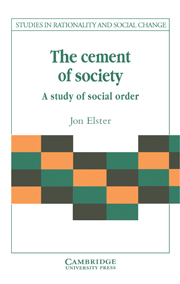Book contents
5 - Collective action and social norms
Published online by Cambridge University Press: 09 January 2010
Summary
Introduction
Writers on collective action take stands that vary from the paradoxical or heroic to the trivial. The paradoxical line is illustrated by the bootstrapping argument of Offe and Wiesenthal, discussed in the preceding chapter. The heroic line is taken by those who stipulate that no explanation of successful collective action should ever appeal to more than rational prudence, with the summit of heroism being reached by those who argue that cooperation can be selfishly rational even in a one-shot Prisoner's Dilemma. Although these writers may not really believe that all successful collective action can be thus explained, they fear that a broader concept of motivation would rob the theory of any explanatory power. This fear is amply justified by the arguments that explain collective action by assuming that the participants must be moved by a norm of cooperation or by a propensity to behave irrationally. This line of reasoning, reminiscent of the dormitive virtue of opium, is indeed utterly trivial, unless the specific norm of cooperation or the specific type of irrationality is defined in a way that is independently meaningful. This is the task of the present chapter.
I shall not assume that there is a norm of cooperation, whose presence and operation can be ascertained by the fact that cooperation takes place. Rather I believe that there exist several distinct norms that may, but need not, induce people to cooperate. These include moral norms, derived from utilitarianism, and the social norms of fairness and everyday Kantianism. Similarly, we can identify a specific type of irrationality – I shall refer to it as magical thinking – that plays an important role in many decisions to cooperate.
- Type
- Chapter
- Information
- The Cement of SocietyA Survey of Social Order, pp. 186 - 214Publisher: Cambridge University PressPrint publication year: 1989
- 1
- Cited by

